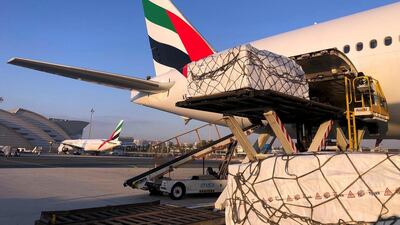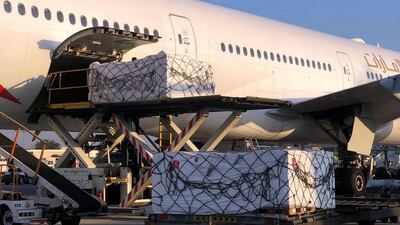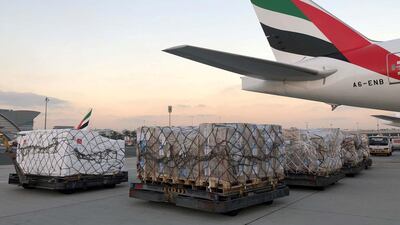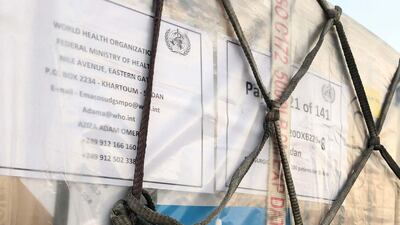Sheikh Mohammed bin Rashid, Vice President and Ruler of Dubai, ordered two plane-loads of humanitarian aid and medical supplies to be flown to Sudan to tackle a health crisis there.
The mission involved supplies from the World Health Organisation’s Logistics Hub in Dubai that were flown to Africa by chartered aircraft on Sunday and Monday.
The medical cargo will ease critical shortages in Sudanese health facilities and increase access to protective and biomedical equipment required for the fight against the coronavirus.
Technical logistics staff from the WHO's Dubai base were also flown to assist Sudan's embattled health workers.
Dubai's International Humanitarian City worked with Emirates SkyCargo, a fellow member of the Vaccine Logistics Alliance, to transfer aid from Dubai International Airport to Khartoum Airport.
"By supporting the emergency response of its member community, IHC’s efforts reflect Sheikh Mohammed bin Rashid’s vision for assisting populations affected by natural disasters and complex emergencies," said Giuseppe Saba, chief executive of the International Humanitarian City.
"IHC has been always together with its community and will continue to proactively support humanitarian actions and continue to serve communities in need."
The first plane touched down in Khartoum on Sunday.
The second delivery, on Monday, contained 54 tonnes of WHO supplies. Valued at $795,000, the aid will reach an estimated 700,000 beneficiaries.
The humanitarian project marked the first time the Dubai centre simultaneously sent technical logistics staff and medical supplies to accelerate a health emergency response.
Last year, from September to December, IHC activated an air bridge carrying aid provided by the humanitarian community and stored within its warehouses in Dubai to support the Sudanese population after major floods.
Tens of thousands of refugees and displaced people fleeing the Tigray region of Ethiopia to Sudan also benefited.
The WHO and IHC are sending emergency health kits, personnel protection equipment, laboratory tests and appropriated medical supplies stored within IHC premises, to help Sudan overcome challenges in detecting, preventing, and mitigating the spread of the coronavirus and providing treatment.
"These supplies are a lifeline for people in need of health care in Sudan," said Dr Nima Abid, WHO representative in Sudan.
"Support from IHC has allowed us to deliver these supplies at a time when they are most needed, to make sure people have access to the health services they need and avoid unnecessary loss of lives.
"WHO is also grateful to the United States Agency for International Development, the European Commission for Civil Protection and Humanitarian Aid, the Sudan Humanitarian Response Fund, and WHO’s Central Emergency Response Fund, whose generous contributions allowed the procurement of these urgently-needed supplies," Dr Abid said.
Timeline
2012-2015
The company offers payments/bribes to win key contracts in the Middle East
May 2017
The UK SFO officially opens investigation into Petrofac’s use of agents, corruption, and potential bribery to secure contracts
September 2021
Petrofac pleads guilty to seven counts of failing to prevent bribery under the UK Bribery Act
October 2021
Court fines Petrofac £77 million for bribery. Former executive receives a two-year suspended sentence
December 2024
Petrofac enters into comprehensive restructuring to strengthen the financial position of the group
May 2025
The High Court of England and Wales approves the company’s restructuring plan
July 2025
The Court of Appeal issues a judgment challenging parts of the restructuring plan
August 2025
Petrofac issues a business update to execute the restructuring and confirms it will appeal the Court of Appeal decision
October 2025
Petrofac loses a major TenneT offshore wind contract worth €13 billion. Holding company files for administration in the UK. Petrofac delisted from the London Stock Exchange
November 2025
180 Petrofac employees laid off in the UAE
Who's who in Yemen conflict
Houthis: Iran-backed rebels who occupy Sanaa and run unrecognised government
Yemeni government: Exiled government in Aden led by eight-member Presidential Leadership Council
Southern Transitional Council: Faction in Yemeni government that seeks autonomy for the south
Habrish 'rebels': Tribal-backed forces feuding with STC over control of oil in government territory
Dengue%20fever%20symptoms
%3Cul%3E%0A%3Cli%3EHigh%20fever%3C%2Fli%3E%0A%3Cli%3EIntense%20pain%20behind%20your%20eyes%3C%2Fli%3E%0A%3Cli%3ESevere%20headache%3C%2Fli%3E%0A%3Cli%3EMuscle%20and%20joint%20pains%3C%2Fli%3E%0A%3Cli%3ENausea%3C%2Fli%3E%0A%3Cli%3EVomiting%3C%2Fli%3E%0A%3Cli%3ESwollen%20glands%3C%2Fli%3E%0A%3Cli%3ERash%3C%2Fli%3E%0A%3C%2Ful%3E%0A%3Cp%3EIf%20symptoms%20occur%2C%20they%20usually%20last%20for%20two-seven%20days%3C%2Fp%3E%0A
Price, base / as tested From Dh173,775 (base model)
Engine 2.0-litre 4cyl turbo, AWD
Power 249hp at 5,500rpm
Torque 365Nm at 1,300-4,500rpm
Gearbox Nine-speed auto
Fuel economy, combined 7.9L/100km
UAE currency: the story behind the money in your pockets
Babumoshai Bandookbaaz
Director: Kushan Nandy
Starring: Nawazuddin Siddiqui, Bidita Bag, Jatin Goswami
Three stars
Groom and Two Brides
Director: Elie Semaan
Starring: Abdullah Boushehri, Laila Abdallah, Lulwa Almulla
Rating: 3/5
Spider-Man%202
%3Cp%3E%3Cstrong%3EDeveloper%3A%3C%2Fstrong%3E%20Insomniac%20Games%0D%3Cbr%3E%3Cstrong%3EPublisher%3A%3C%2Fstrong%3E%20%20Sony%20Interactive%20Entertainment%0D%3Cbr%3E%3Cstrong%3EConsole%3A%20%3C%2Fstrong%3EPlayStation%205%0D%3Cbr%3E%3Cstrong%3ERating%3A%3C%2Fstrong%3E%205%2F5%3C%2Fp%3E%0A
Sholto Byrnes on Myanmar politics
LA LIGA FIXTURES
Saturday (UAE kick-off times)
Leganes v Getafe (12am)
Levante v Alaves (4pm)
Real Madrid v Sevilla (7pm)
Osasuna v Valladolid (9.30pm)
Sunday
Eibar v Atletico Madrid (12am)
Mallorca v Valencia (3pm)
Real Betis v Real Sociedad (5pm)
Villarreal v Espanyol (7pm)
Athletic Bilbao v Celta Vigo (9.30pm)
Monday
Barcelona v Granada (12am)
Name: Brendalle Belaza
From: Crossing Rubber, Philippines
Arrived in the UAE: 2007
Favourite place in Abu Dhabi: NYUAD campus
Favourite photography style: Street photography
Favourite book: Harry Potter
The specs
Engine: 2.0-litre 4-cyl, 48V hybrid
Transmission: eight-speed automatic
Power: 325bhp
Torque: 450Nm
Price: Dh289,000
Explainer: Tanween Design Programme
Non-profit arts studio Tashkeel launched this annual initiative with the intention of supporting budding designers in the UAE. This year, three talents were chosen from hundreds of applicants to be a part of the sixth creative development programme. These are architect Abdulla Al Mulla, interior designer Lana El Samman and graphic designer Yara Habib.
The trio have been guided by experts from the industry over the course of nine months, as they developed their own products that merge their unique styles with traditional elements of Emirati design. This includes laboratory sessions, experimental and collaborative practice, investigation of new business models and evaluation.
It is led by British contemporary design project specialist Helen Voce and mentor Kevin Badni, and offers participants access to experts from across the world, including the likes of UK designer Gareth Neal and multidisciplinary designer and entrepreneur, Sheikh Salem Al Qassimi.
The final pieces are being revealed in a worldwide limited-edition release on the first day of Downtown Designs at Dubai Design Week 2019. Tashkeel will be at stand E31 at the exhibition.
Lisa Ball-Lechgar, deputy director of Tashkeel, said: “The diversity and calibre of the applicants this year … is reflective of the dynamic change that the UAE art and design industry is witnessing, with young creators resolute in making their bold design ideas a reality.”
Other acts on the Jazz Garden bill
Sharrie Williams
The American singer is hugely respected in blues circles due to her passionate vocals and songwriting. Born and raised in Michigan, Williams began recording and touring as a teenage gospel singer. Her career took off with the blues band The Wiseguys. Such was the acclaim of their live shows that they toured throughout Europe and in Africa. As a solo artist, Williams has also collaborated with the likes of the late Dizzy Gillespie, Van Morrison and Mavis Staples.
Lin Rountree
An accomplished smooth jazz artist who blends his chilled approach with R‘n’B. Trained at the Duke Ellington School of the Arts in Washington, DC, Rountree formed his own band in 2004. He has also recorded with the likes of Kem, Dwele and Conya Doss. He comes to Dubai on the back of his new single Pass The Groove, from his forthcoming 2018 album Stronger Still, which may follow his five previous solo albums in cracking the top 10 of the US jazz charts.
Anita Williams
Dubai-based singer Anita Williams will open the night with a set of covers and swing, jazz and blues standards that made her an in-demand singer across the emirate. The Irish singer has been performing in Dubai since 2008 at venues such as MusicHall and Voda Bar. Her Jazz Garden appearance is career highlight as she will use the event to perform the original song Big Blue Eyes, the single from her debut solo album, due for release soon.
The years Ramadan fell in May
DUBAI WORLD CUP CARNIVAL CARD
6.30pm Handicap US$135,000 (Turf) 2,410m
7.05pm UAE 1000 Guineas Listed $250,000 (Dirt) 1,600m
7.40pm Dubai Dash Listed $175,000 (T) 1,000m
8.15pm Al Bastakiya Trial Conditions $100,000 (D) 1.900m
8.50pm Al Fahidi Fort Group Two $250,000 (T) 1,400m
9.25pm Handicap $135,000 (D) 2,000m
The National selections
6.30pm: Gifts Of Gold
7.05pm Final Song
7.40pm Equilateral
8.15pm Dark Of Night
8.50pm Mythical Magic
9.25pm Franz Kafka
China and the UAE agree comprehensive strategic partnership
China and the UAE forged even closer links between the two countries during the landmark state visit after finalising a ten-point agreement on a range of issues, from international affairs to the economy and trade and renewable energy.
1. Politics: The two countries agreed to support each other on issues of security and to work together on regional and international challenges. The nations also confirmed that the number of high-level state visits between China and the UAE will increase.
2. Economy: The UAE offers its full support to China's Belt and Road Initiative, which will combine a land 'economic belt" and a "maritime silk road" that will link China with the Arabian Gulf as well as Southeast, South and Central China, North Africa and, eventually, Europe.
3. Business and innovation: The two nations are committed to exploring new partnerships in sectors such as Artificial Intelligence, energy, the aviation and transport industries and have vowed to build economic co-operation through the UAE-China Business Committee.
4. Education, science and technology: The Partnership Programme between Arab countries in Science and Technology will encourage young Emirati scientists to conduct research in China, while the nations will work together on the peaceful use of nuclear energy, renewable energy and space projects.
5. Renewable energy and water: The two countries will partner to develop renewable energy schemes and work to reduce climate change. The nations have also reiterated their support for the Abu Dhabi-based International Renewable Energy Agency.
6. Oil and gas: The UAE and China will work in partnership in the crude oil trade and the exploration and development of oil and natural gas resources.
7. Military and law enforcement and security fields: Joint training will take place between the Chinese and UAE armed forces, while the two nations will step up efforts to combat terrorism and organised crime.
8. Culture and humanitarian issues: Joint cultural projects will be developed and partnerships will be cultivated on the preservation of heritage, contemporary art and tourism.
9. Movement between countries: China and the UAE made clear their intent to encourage travel between the countries through a wide-ranging visa waiver agreement.
10. Implementing the strategic partnership: The Intergovernmental Co-operation Committee, established last year, will be used to ensure the objectives of the partnership are implemented.
RACE CARD
6.30pm: Maiden (TB) Dh82,500 (Dirt) 1,200m
7.05pm: Maiden (TB) Dh82,500 (D) 1,900m
7.40pm: Handicap (TB) Dh102,500 (D) 2,000m
8.15pm: Conditions (TB) Dh120,000 (D) 1,600m
8.50pm: Handicap (TB) Dh95,000 (D) 1,600m
9.25pm: Handicap (TB) Dh87,500 (D) 1,400m




